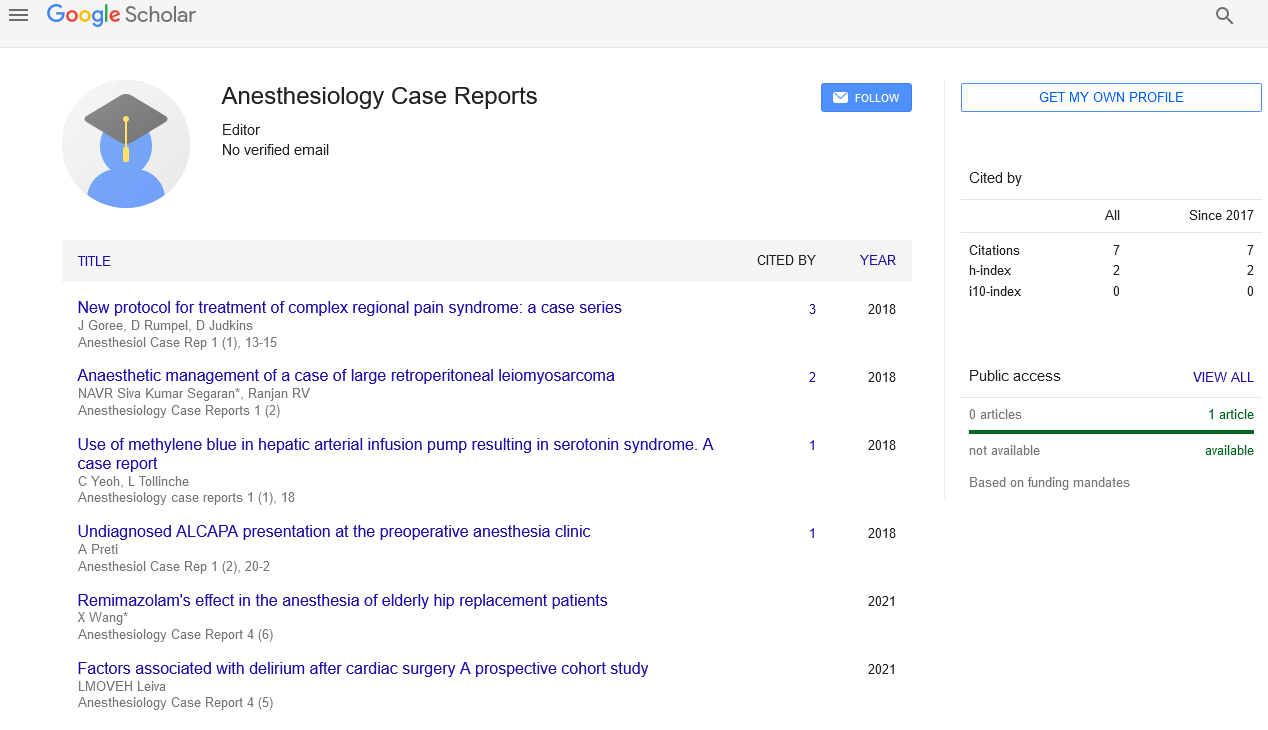The Effect of Veno-arterial Extracorporeal Membrane Oxygenation in Refractory Septic Shock
Received: 14-Mar-2023, Manuscript No. pulacr-23-6465; Editor assigned: 19-Mar-2023, Pre QC No. pulacr-23-6465 (PQ); Accepted Date: Apr 07, 2023; Reviewed: 30-Mar-2023 QC No. pulacr-23-6465 (Q); Revised: 03-Apr-2023, Manuscript No. pulacr-23-6465 (R); Published: 11-Apr-2023
Citation: Fatima N. The effect of veno-arterial extracorporeal membrane oxygenation in refractory septic shock. Anesthesiol Case Rep. 2023; 6(2) 18-19
This open-access article is distributed under the terms of the Creative Commons Attribution Non-Commercial License (CC BY-NC) (http://creativecommons.org/licenses/by-nc/4.0/), which permits reuse, distribution and reproduction of the article, provided that the original work is properly cited and the reuse is restricted to noncommercial purposes. For commercial reuse, contact reprints@pulsus.com
Abstract
The use of Veno-Arterial Extracorporeal Membrane Oxygenation (VAThe effect of veno-arterial extracorporeal membrane (ECMO) for immunoadsorption has been shown to be effective in lowering mortality rates in neonatal and paediatric patients suffering from severe sepsis and septic shock. However, the efficacy of this treatment in adult patients with septic shock is debatable. The purpose of this study was to evaluate the potential of VA-ECMO as an immunoadsorption treatment in patients with severe sepsis and septic shock.
Key Words
Prolonged ventilation; Septic shock; Severe sepsis
Introduction
The use of Extracorporeal Membrane Oxygenation (ECMO) in adult patients with septic shock is still debated. ECMO is used (ARDS) patients who have respiratory failure, particularly those who have circulatory failure owing to septic shock. Patients who do not improve with traditional mechanical ventilation and typical treatment measures, including poor responses to inotropes and vasopressors, may benefit from Veno-Arterial ECMO (VA-ECMO) [1-5]. Recent research suggests that VA-ECMO is helpful in adult patients suffering from septic shock because it is a reliable circulatory and ventilatory support therapy with immunoadsorption effects on bacteremia and toxaemia. A total of 100 adult patients with severe pulmonary contusions and prolonged respiratory failure despite ten days of mechanical ventilation participated in this study. These patients went on to develop severe sepsis, VAP with ARDS, and a high Murray score (>3 points), Sequential Organ Failure Assessment (SOFA) score (> 12 points), and Clinical Pulmonary Infection Score (CPIS) (> 6 points). After that, the patients were separated into two groups: group A (n = 50) received conventional care, whereas group B (n = 50) received VA-ECMO. Furthermore, the outcomes were compared and patients in Group B improved significantly on Murray, SOFA, and CPIS scores. Furthermore, a high proportion of patients in group B were effectively weaned from inotropic support as well as mechanical ventilation and were discharged from the ICU. However, no statistically significant difference in death rates was found between the two groups. In terms of improving patients' general health, significant improvements in the APACHE II score, total leucocyte count, and core body temperature were noted in patients in group B compared to those in group A. These gains can be due to the use of ECMO, which offered greater tissue oxygenation when compared to non-functional, infected, and contused lungs. In group B, improved tissue oxygenation resulted in improved systemic oxygenation as well as improved cellular and humoral immunity, which aided in the management of both bacteremia and toxaemia induced by VAP. As a result, the management of all general indications of Systemic Inflammatory Response Syndrome (SIRS) was facilitated, as was the rapid control of several indicators such as CPIS score, SOFA score, and weaning from inotropic support and mechanical breathing. VA-ECMO significantly slows the progression of sepsis, reduces ICU stay, and accelerates weaning from inotropic support and mechanical ventilation. However, it has little effect on the death rate of adult septic shock patients.
References
- Smith I, Kranke P, Murat I, et sl. Perioperative fasting in adults and children: guidelines from the European Society of Anaesthesiology. Eur J Anaesthesiol. 2011 ;28(8):556-69.Google Scholar Crossref
- Jayaram A, Bowen MP, Deshpande S, et al. Ultrasound examination of the stomach contents of women in the postpartum period. Anesth Analg. 1997;84(3):522-6.Google Scholar Crossref
- Perlas A, Chan VW, Lupu CM, et al. Ultrasound assessment of gastric content and volume. J Am Soc Anesthesiol. 2009;111(1):82-9.Google Scholar Crossref
- Perlas A, Davis L, Khan M, et al. Gastric sonography in the fasted surgical patient: a prospective descriptive study. Anesth Analg. 2011;113(1):93-7. Google Scholar Crossref
- Fujigaki T, Fukusaki M, Nakamura H, et al. Quantitative evaluation of gastric contents using ultrasound. J Clin Anesth. 1993;5(6):451-5.Google Scholar Crossref





